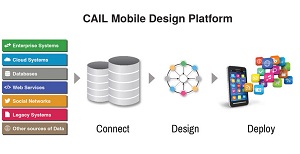Again with the 'Codeless' Mobile App Building
Programming is hard. Programming modern mobile apps is wicked hard. There's no getting around it, though a lot of companies are trying to do just that.
Yesterday saw a new effort from CAIL Mobile Solutions. "Rather than going through the traditional app development process, the CAIL Mobile Design Platform provides the mobile enterprise with easy-to-use, codeless templates, prebuilt forms, drag-and-drop capabilities, and various setup options," the company said.
A new tool for the platform is the CAIL Mobile Doc-2-App tool for creating and sharing documents. Basically it takes documents in familiar formats -- Word, Excel, PowerPoint and PDF -- and converts them into mobile "apps" that can be viewed on iOS or Android devices. Another tool, Email-2-App, can work with the document tool to automatically convert documents attached to e-mail messages into apps, with no user intervention needed at all.
For app building, the platform lets users choose from different templates, such as classic, mosaic, list and full page, and then drag data icons into frames on the template to add text, images or more specialized functionality such as queries reporting "customers per quarter" or "orders per region" from a database. Once the app is edited and customized the way you want, you hit publish and users who have installed the app previously will see the updated content.
 [Click on image for larger view.]
The CAIL Mobile Design Platform workflow. (source: CAIL Mobile Solutions)
[Click on image for larger view.]
The CAIL Mobile Design Platform workflow. (source: CAIL Mobile Solutions)
The system can be deployed on-premises behind a firewall or to private, public, hybrid or Software-as-a-Service (SaaS) clouds, with "no need for any coding or development to connect to your data sources."
Also yesterday came an announcement from another company wrestling with the document problem, Canvas Solutions Inc. It provides a cloud-based service to provide "an easy, fast and economical way for businesses to find, customize and create mobile forms to replace paper forms." The company announced new integration with cloud-based storage services to automatically transfer data collected by its mobile apps to Dropbox, Box, Evernote or Google Drive.
For actually creating or editing the custom apps, Canvas supplies an app builder featuring a dashboard to add or manage users, track submissions, view reports and usage.
To get around that pesky coding thing, the company runs an app store with more than 1,400 prebuilt offerings that can be customized for your business. The apps offer incredible specificity, ranging from a waiver and release form to protect pool owners to an app to report injury accidents at laser tag entertainment centers.
If those aren't specific enough, Canvas will convert your first form to an app for free with a trial subscription.
Also getting in on the free app creation market is BuildFire, which last week announced its own mobile app creation platform. "At the heart of the platform is BuildFire's revolutionary 'click-and-edit' dashboard, which provides a simple user interface with no coding required," the company said. If that's too much for you, the company will build your app for free.
"After simply typing in your Web address, BuildFire will deliver a custom, handcrafted, and ready-to-publish native smartphone, tablet, and web app within two business days for free," the company said. The service costs $49 per month after a 14-day trial.
As stated in an introductory video, the service targets organizations that see their customers going mobile and don't want to get left behind, but who have "a limited budget and no real technical skills."
BuildFire also uses templates, such as for small businesses, education, nonprofits and more. "Literally anyone can both build and maintain high-quality and highly engaging apps with the utmost ease," the company said. "Our system is easy to navigate and requires no coding whatsoever. So whether you're a DIYer or a white labeler, we make it easy for you to look like a pro."
Well, I'm a DIYer hobbyist, but I haven't tried any of the above products, so I can't speak to the vendors' claims.
However, I recently decided to try my hand at mobile app building. Having had some previous experience with Java, I targeted the Android platform. It took me the better part of a weekend just to download, install and configure the regular Eclipse IDE and the Google-customized ADT Eclipse IDE and build a simple "Hello World" app and transfer it to my Android device. Granted, a flawed tutorial caused much of that pain. A time-consuming search for a solution revealed the tutorial has been causing the same pain to developers for years but hasn't been corrected, though someone finally provided a missing step, to the thankful accolades of frustrated newbies everywhere.
Anyway, by the time I created anything useful, the industry would have long since moved on. Apps will be beamed to our brains and we'll control them with thoughts. "A mobile device app? What's that?"
Hmm, maybe there's something to this codeless thing after all.
What's your experience with codeless, drag-and-drop tools? Do you and your coding expertise feel threatened? Please comment here or drop me a line.
Posted by David Ramel on August 12, 2014